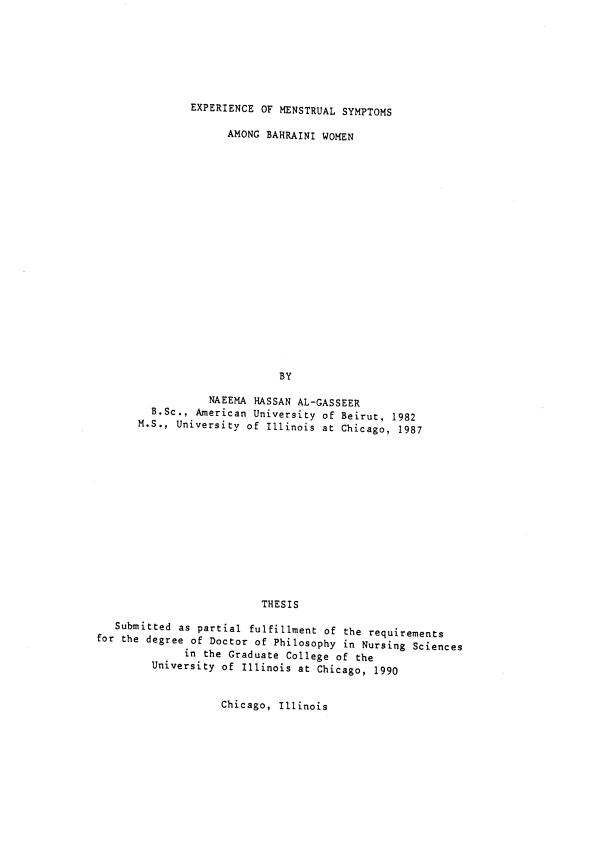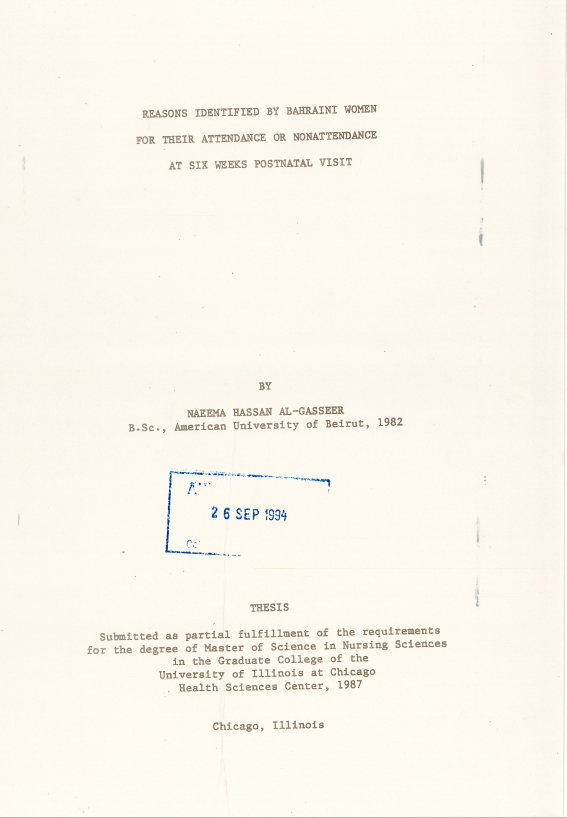وثيقة
المعرف
https://digitalrepository.uob.edu.bh/id/2ae0df4d-3a2a-4d5b-ac07-b50d07d3e22b
EXPERIENCE OF MENSTRUAL SYMPTOMS AMONG BAHRAINI WOMEN
تاريخ النشر
1990
اللغة
الأنجليزية
مدى
[1], 16, 219, pages
مكان المؤسسة
University of Illinois
نوع الرسالة الجامعية
Thesis (BHD)
الملخص الإنجليزي
ABSTRACT:
There have been considerable studies of menstrual cycle symptoms in Western cultures. However, such symptoms are only beginning to be studied in Middle Eastern cultures. The purpose of this study was to
identify the menstrual symptoms that Bahraini women experience, to assess the reliability and validity of Moos Menstrual Distress Questionnaire (MDQ) Form C among Bahraini women, and to identify method-
ological issues in cross-cultural studies. A randomly selected sample of 172 Bahraini women completed the menstrual symptoms questionnaire, which includes the Moos MDQ, in face-to-face interviews. Ages ranged from 17 to 45 years, with a mean of 28 years. Open-ended interview
questions were content analyzed and categorized. Data were analyzed
using SPSSX software. The results indicated that (a) 10 of the 49 symptoms on the Moos MDQ
had a prevalence rate of 30% or greater for the menstrual phase and only 8 symptoms for the premenstrual phase; (b) younger age group (17-24 years) reported more menstrual symptoms; (c) educated women reported more menstrual and premenstrual symptoms; (d) working women reported more premenstrual symptoms; (e) menstrual cycle characteristics such as age at menarche and cycle length were positively correlated with men- strual symptoms. The initial psychometric evaluation of Moos MDQ tested in Bahrain
revealed a high internal consistency alpha coefficient of 0.89 for the menstrual phase, 0.86 for the premenstrual phase, and 0.67 for the intermenstrual phase. Separate principal components analyses were performed for the men-strual and premenstrual phases, with orthogonal rotation used for vari-
ables that loaded .30 or more. The menstrual phase yielded nine factors (36 items) which explained 62.8% of the variance. The premenstrual phase yielded six factors (35 items) explained 61.5% of the variance.
Methodological issues addressed concerned the use of a standardized questionnaire to study the menstrual cycle cross-culturally, such as the translation of the questionnaire, assessing its reliability and valid-ity, and the women's understanding of the questionnaire. Recommendations for further study were made in the areas of nursing research, practice, and education. In particular, it was recommended
that further research using the modified Moos MDQ be conducted in a prospective study extending over more than one cycle.
المجموعة
قالب العنصر
أطروحات


